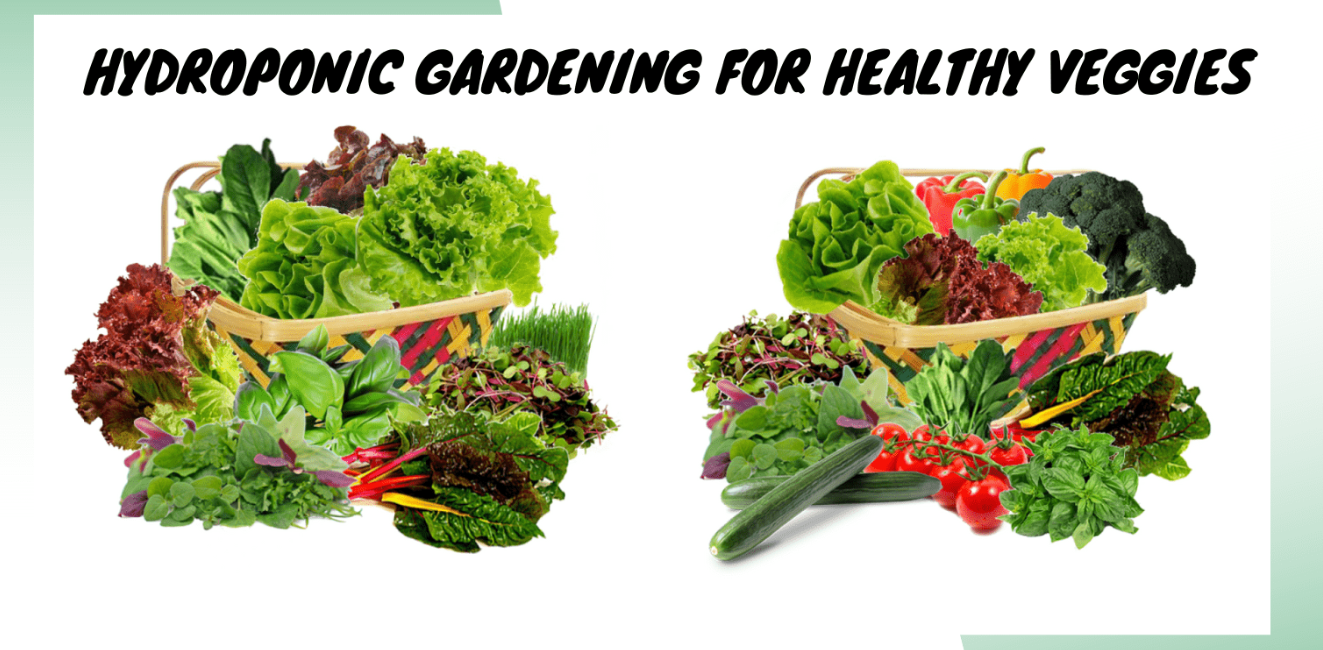Hydroponic gardening is a great way to grow healthy, organic vegetables in your own backyard. Unlike traditional gardening methods, hydroponic gardening does not require soil and can be done indoors, allowing for year-round vegetable production. Hydroponic gardening is becoming increasingly popular due to its many benefits, including increased productivity, reduced water and nutrient usage, and improved pest control. With hydroponic gardening, you can enjoy the freshest, healthiest veggies without the mess of traditional gardening methods.
What is hydroponic gardening?
Hydroponic gardening is a type of gardening where plants are grown without the use of soil, instead relying on nutrient-rich water solutions to provide the necessary elements for growth. Hydroponic gardening has become increasingly popular in recent years due to its many benefits, including faster growth and yields of healthier vegetables and fruits.
Benefits of hydroponic gardening include:
• Increased nutrient density – Plants grown in hydroponic systems typically contain more essential vitamins and minerals than their soil-grown counterparts due to increased access to oxygen and nutrients in the water solution.
• Faster growth rates – Hydroponic systems allow for faster growth rates than traditional soil-based gardens, which can mean earlier harvests and bigger yields.
• Less space required – Because plants are able to take up more nutrients in a shorter period of time, you don’t need as much space for a hydroponic garden as you would for a soil-based garden.
• Easier maintenance – With hydroponic gardening, you don’t have to worry about weeding, fertilizing or controlling pests as you would with a soil-based garden.
• Environmentally friendly – Hydroponic gardening uses significantly less water than soil-based gardening, and also reduces the risk of runoff and erosion.
If you’re looking for a healthy and sustainable way to grow your vegetables and fruits, hydroponic gardening might be just the solution you’re looking for. With its many benefits, hydroponic gardening can provide you with a bountiful harvest of delicious and nutritious produce.
The benefits of hydroponic gardening
Hydroponic gardening is a revolutionary new way to grow vegetables without soil. Instead of relying on traditional soil and irrigation, hydroponic gardening involves using water and nutrients to feed plants directly. This method of growing vegetables has many benefits that make it an attractive option for gardeners of all levels.
One of the most significant benefits of hydroponic gardening is that it is much more efficient than traditional soil-based gardening. The water and nutrient solution are administered directly to the plant’s roots, meaning that there is less water wasted in the process. Furthermore, since hydroponic systems use closed-loop systems, they are extremely effective at retaining the nutrients used to feed the plants, which helps reduce waste.
Another benefit of hydroponic gardening is that it requires less space than traditional soil-based gardening. This makes it ideal for those who may not have access to a large outdoor space or a lot of land. Additionally, since hydroponic systems are relatively easy to set up, they are an excellent choice for those who may be new to gardening or may not have a lot of time or resources to devote to a traditional garden.
Additionally, hydroponic gardening eliminates many of the problems associated with traditional gardening, such as weeds and pests. Since the plants are grown in a closed system, pests and disease are less likely to become a problem. This also eliminates the need for chemical pesticides or herbicides, making it a much more environmentally friendly option than traditional soil-based gardening.
Finally, hydroponic gardening can yield higher quality produce than traditional soil-based gardens. Since the plants receive direct access to water and nutrients, they can achieve higher levels of health and produce higher yields with fewer inputs. This makes hydroponic gardening a great option for those looking to maximize their garden’s potential.
In conclusion, hydroponic gardening is an attractive option for both experienced and novice gardeners alike. It offers numerous benefits, including higher efficiency, less waste, smaller footprint, reduced pest and disease issues, and higher yields with fewer inputs. For these reasons, it is becoming an increasingly popular choice among gardeners everywhere.
The best vegetables to grow in a hydroponic garden
Some of the best vegetables to grow in a hydroponic garden include tomatoes, cucumbers, peppers, lettuce, kale, and spinach. Tomatoes are especially easy to grow in hydroponics since their vines don’t require much space to spread out. You can also harvest fresh cucumbers, peppers, and other vegetables in a relatively short time frame.
Hydroponic gardening is an efficient and effective way to grow healthy vegetables at home. Hydroponic systems use a nutrient-rich water solution instead of soil to provide plants with the minerals and oxygen they need for optimal growth. This results in bigger, tastier veggies that are high in nutrients.
Lettuce is a great choice for a hydroponic garden because it grows quickly and can be harvested multiple times in a season. Kale and spinach also thrive in a hydroponic environment and make excellent additions to salads or smoothies.
No matter what vegetables you choose to grow, hydroponic gardening offers numerous benefits. Plants grown hydroponically have increased access to oxygen, resulting in faster growth and higher yields. They also require fewer resources like water and fertilizer, so they can be grown more sustainably than traditional soil-based gardens.
If you’re looking for a way to grow delicious, nutritious vegetables at home, hydroponic gardening is definitely worth considering. With the right setup, you can enjoy fresh produce year-round!
How to get started with hydroponic gardening
Hydroponic gardening is an easy and rewarding way to grow fresh vegetables in your own home. This type of gardening uses a soil-less medium, like water or sand, to grow plants. It requires no tilling, weeding, or pesticide use, making it an eco-friendly option for gardeners. Hydroponic gardens are also great for small spaces, since they don’t require a lot of room.
Getting started with hydroponic gardening is simple. First, you need to choose the right containers for your plants. Hydroponic systems come in a variety of shapes and sizes, so you can pick one that fits your space and needs. Be sure to choose a container that is deep enough for your plants’ roots to develop properly.





